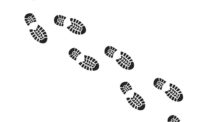National Walking Day is April 1

 Adults are becoming less active, which can increase our risk of heart disease, stroke and other diseases. About 80 percent of adults do not meet the recommended amount of physical activity each week. Adult (and childhood) obesity/overweight levels are high: about a third of U.S. children and 69 percent of adults are obese or overweight.
Adults are becoming less active, which can increase our risk of heart disease, stroke and other diseases. About 80 percent of adults do not meet the recommended amount of physical activity each week. Adult (and childhood) obesity/overweight levels are high: about a third of U.S. children and 69 percent of adults are obese or overweight.
The good news is you can help by encouraging your community and company to take part in the American Heart Association's National Walking Day.
Lace up your sneakers
On Wednesday, April 1, Americans are encouraged to lace up their sneakers and take at least 30 minutes out of their day to get up and walk. It's a great way to raise awareness of the importance of physical activity and to get your family, friends and co-workers on the right path to a healthier way of life.
Walking has many health benefits, which makes National Walking Day the ideal time to kick-start your physical activity routine. Adults should get at least 150 minutes of moderately intense physical activity (such as brisk walking) per week, while kids should get 60 minutes of physical activity a day.
An online conversation
In addition to taking 30 minutes out of your day to get up and walk, there are other ways you can participate in National Walking Day. The American Heart Association will be hosting a Physical Activity Post Stroke and Heart Attack Conversation on the Support Network on April 1, from 10 a.m. ET to 7 p.m. ET (http://supportnetwork.heart.org/NWDregistration). Topics for the all-day, come-and-go event will include something for everyone including discussions on physical activity, cardiac rehab, stroke rehab, walking, jogging, yoga, swimming, and much more.
A different medical professional will participate for every hour of the chat, answering questions related to physical activity and recovery. Be sure to join the Support Network, take part in the chat and get your 30 minutes of walking in for a successful National Walking Day.
For more information about walking and living a healthy lifestyle visit: www.heart.org/physicalactivity.
Looking for a reprint of this article?
From high-res PDFs to custom plaques, order your copy today!







